The Murdoch Succession Fight Is Over. So What Does Lachlan Control?

© Eric Lee/The New York Times

© Eric Lee/The New York Times

中国通过龙一号反应堆控制了核能,这标志着其在第三代核能领域霸权。这项技术基于成熟的压水堆(PWR)技术,但与前几代技术相比有了显著改进。它尤其吸取了福岛核电站事故的经验教训,配备了冗余的被动和主动安全系统,并加强了抗震措施。
华龙一号反应堆 中国是世界新的核冠军手
这座华龙一号核电机组每年可减少约800万吨二氧化碳排放,相当于减少300万吨未燃煤。在卡拉奇,两座已投入运营的反应堆已发电480亿千瓦时,减少二氧化碳排放3900万吨。这相当于一年内减少800万辆内燃机汽车上路。
首台机组投产十余年后,仅用5.7年时间就按计划竣工。这在核电行业实属罕见。它甚至在WANO(世界核电运营者协会)的评估中获得了满分,证明了其可靠性。
通过核安全严格认证 欧洲标准 一顶双层安全帽
华龙一号已成功通过英国通用设计评估,这是全球最严格的认证流程之一。此外,它还通过了符合欧洲运营商要求的认证。没有重大的监管障碍,这为其在欧洲建立分支机构开通铺平了道路。
它还获得了中国国家优质工程奖,国家不仅认可其设计,还认可了制造和集成质量。相比之下,法国在弗拉芒维尔核电站连接首台EPR用了近16年的时间。对比鲜明,令人叹为观止。
100% 中国制造,数千家企业参与
华龙一号的设计立基于中国30年的核技术积累。近6000家本土企业参与了从涡轮机生产到燃料包壳制造的整个过程。最终,这座反应堆完全在中国本土制造,不再严重依赖外国资源。
其生态系统涵盖2044项行业标准、700项国家专利、65项国际专利和125项软件著作权。中国不仅制造,还在记录、编纂和输出其自身的技术标准。
一项堪比太空计划的科学合作
华龙一号的成功还依赖于产学研和高等教育之间强有力的联盟。75所中国大学和研究所、14个国际合作伙伴以及克服的179项技术挑战都是全国范围内协调努力的体现。
这让人想起大型航空航天项目所采用的方法。其目标是能源。但其外交、经济和气候影响远远超过了对于工程的影响。
出口、外交和能源转型
华龙一号是“一带一路”倡议的重要组成部分。它已征服巴基斯坦和阿根廷,并与其他国家签署了约二十个合作协议。它不仅能为整个城市提供电力,还能建立持久的技术联盟。
对于伙伴国家而言,这项选择具有战略意义:大规模装备低碳能源,比西方的EPR(每台约60亿至80亿欧元)更便宜,并且不依赖外国浓缩铀。对于中国而言,这是一个全球影响力的杠杆、一个技术展示平台,也是对其2060年实现碳中和目标的回应。

第二届非洲气候峰会(ACS2-2e Sommet africain sur le climat)于2025年09月08日星期一在东非国家埃塞俄比亚(l'Éthiopie)首都亚的斯亚贝巴(Addis-Abeba)举行。本台法广非洲组(RFI Afrique)报道说,本届峰会预计为期两天。有40多位非洲国家元首和政府首脑预计与会。在此之际,本台法广(RFI)[非洲经济](Afrique Economie)专栏记者于周一早上刊出一篇采访报道,介绍非洲国家对太阳能电池板的进口量大幅增加。非洲在2024年7月至2025年6月的十二个月里,进口了相当于15,000兆瓦(mégawatts)的太阳能电池板,发电能力相当于10座核反应堆。对此,研究团体Ember指出,这就是太阳能在整个非洲大陆腾飞的证据,并将推动储能技术发展 。
本台法广(RFI)法语记者克莱尔(Claire)在[非洲经济]栏目(Chronique Afrique Economie)报道的开头首先指出,相关研究是基于中国海关的统计数据。因为,中国是非洲太阳能电池板的主要供应方。
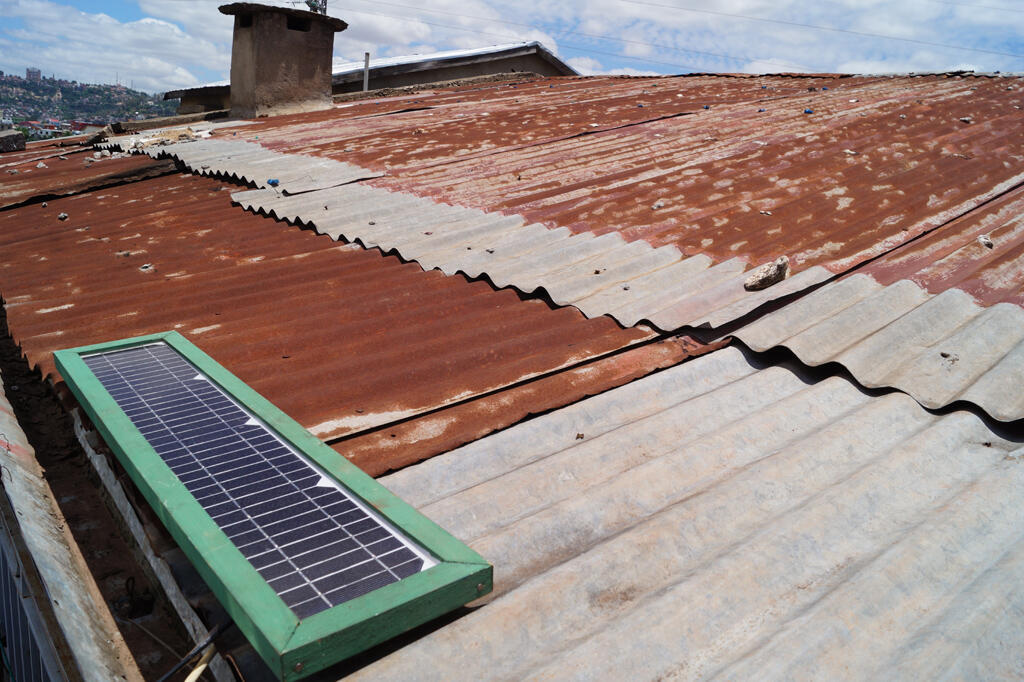
非洲大陆在2024年7月至2025年6月期间对太阳能电池板的进口量增长60%。如果不统计南非,非洲其它国家在过去两年里的光伏板进口量甚至翻了一倍。
-- 非洲12个月里对太阳能电池板的进口增长迅猛 --
同一报道引述研究团体Ember首席分析师Dave Jones的解释:阿尔及利亚(l'Algérie)的太阳能电池板进口量,在一年里增长了33倍。这是非洲进口量第三大的国家,排在南非(l'Afrique du Sud)和尼日利亚(le Nigeria)之后。赞比亚(la Zambie)的进口量在12个月里翻了8倍,博茨瓦纳(le Botswana)增长了7倍,苏丹(le Soudan)的增幅是6倍,尼日利亚(le Nigéria)、刚果民主共和国(RD Congo)和贝宁(le Bénin)的进口量也都多达3倍以上。
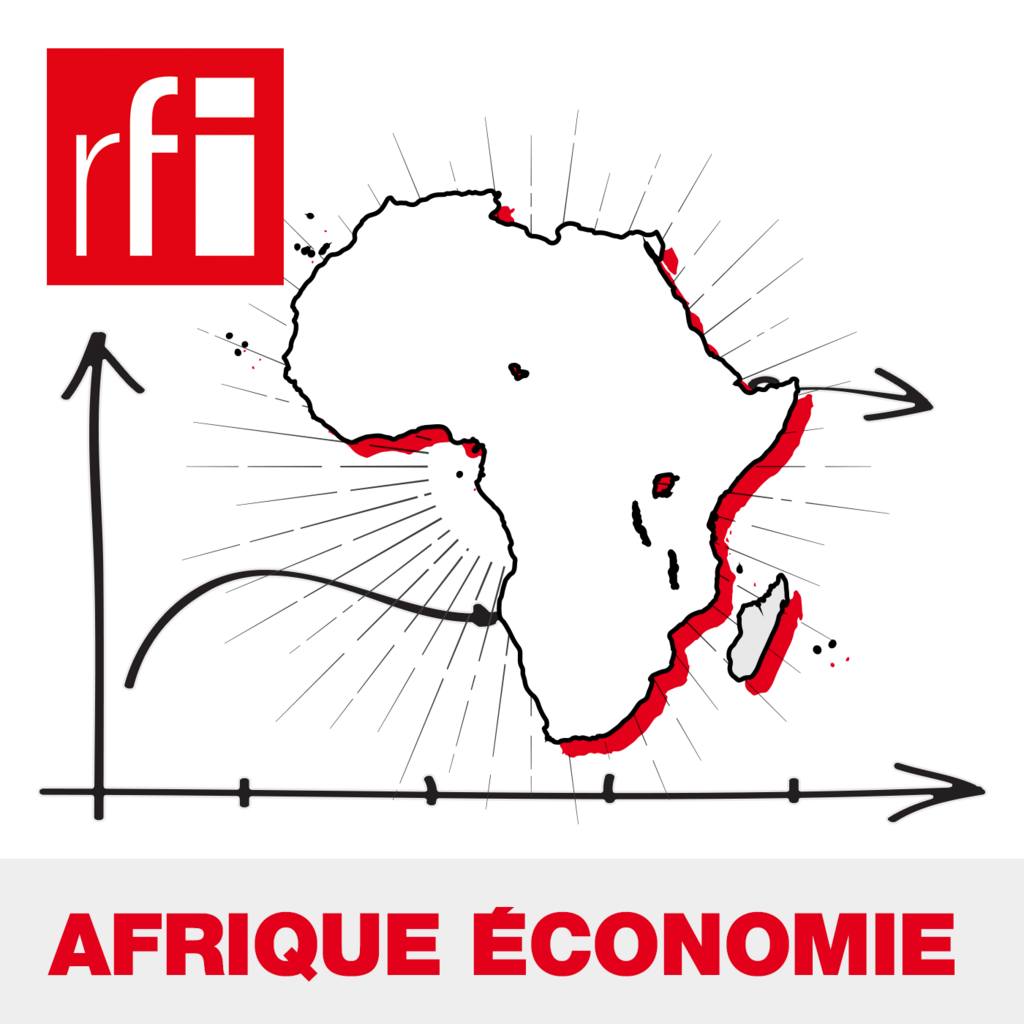
乍得(le Tchad)在一年里进口的太阳能电池板,一旦完成组装,发电量可达该国一半的电力供应。这不仅预示了非洲电力供应的增加,也可能带来电价走低的潜力。Dave Jones指出:在尼日利亚(le Nigéria),现在一块太阳能电池板的价格大约为60美元。然而,节省下来的柴油花费可以在六个月里收回太阳能板的成本。在其它一些国家甚至还更短。
-- 太阳能在非洲的广泛部署将推动储能技术发展 --
本台法广(RFI)[非洲经济]栏目(Chronique Afrique Economie)在报道中指出,研究团体Ember在调阅了卫星图像数据后认为,大多数太阳能板,16,000吉瓦(16 000 gigawatts)到目前为止,都被用于并网太阳能电站。不过,分散用电,目前为6,000吉瓦(6 000 gigawatts)也在不断壮大。非洲可再生能源领域的先锋企业Africa REN的总裁(PDG)Gilles Parmentier接受采访说:“这都是一些企业或工业用户,无论地点是否偏远,他们都将是这一设施的唯一客户。那可以是安装在超市或工厂屋顶上的太阳能电池板,也可能是为矿区建设的太阳能电站(une centrale solaire )。最后一种情况是,在那些偏远的村庄,部分运营商会建议使用家用太阳能套件(des kits solaires )。”
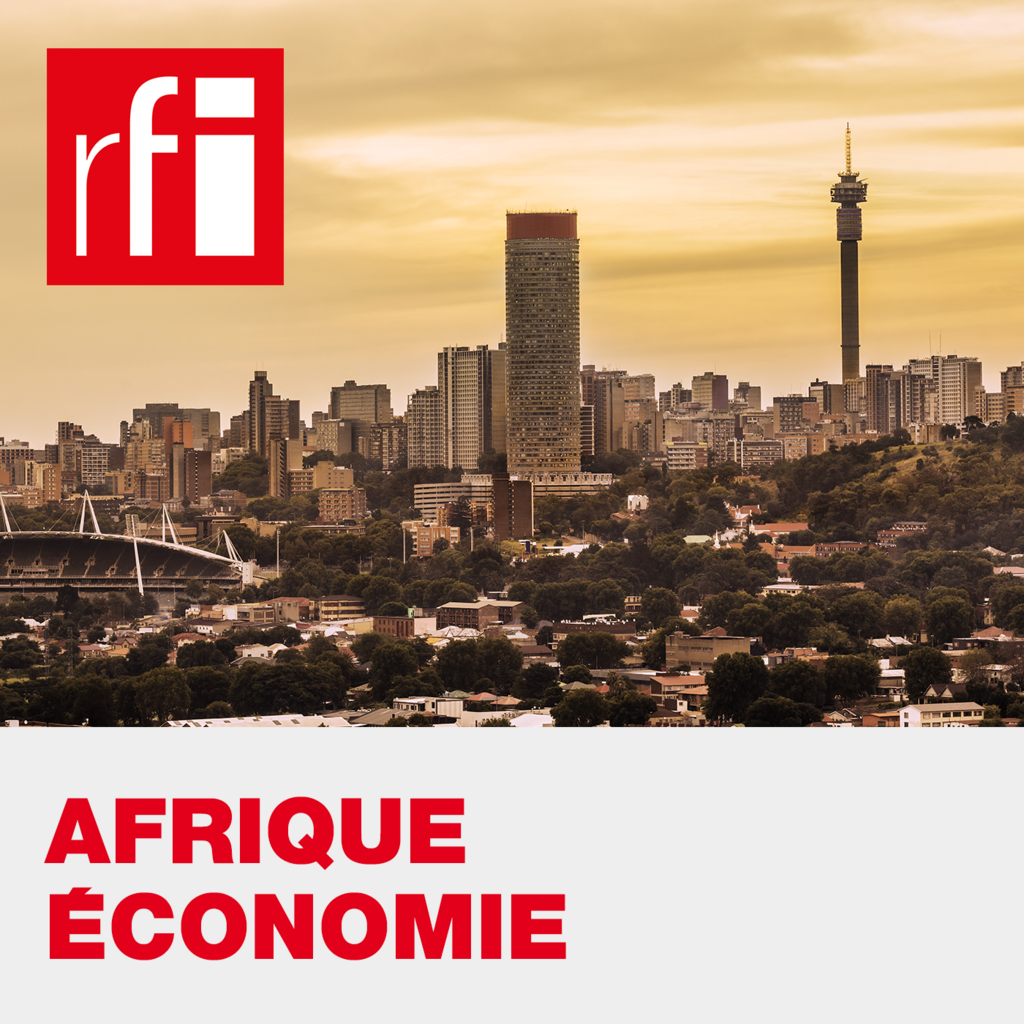
本台法广(RFI)[非洲经济]栏目(Chronique Afrique Economie)的这篇报道最后指出,太阳能在非洲的广泛部署引出了需要解决这种能源存在间歇(intermittence)问题的挑战。Africa REN的总裁(PDG)的表示,下一步的关键是要开发储能项目(projets de stockage),如同人们在塞内加尔(le Sénégal)做的Walo Storage。帮助电力公司稳定电网,并将太阳能发电时间从白天调整到晚上。。。为了伴随非洲太阳能电站的需要,另一挑战将是电网的发展。
( 翻译和编辑:法广 RFI 电台 尼古拉 )
~. Fin .~

© Emily Najera for The New York Times

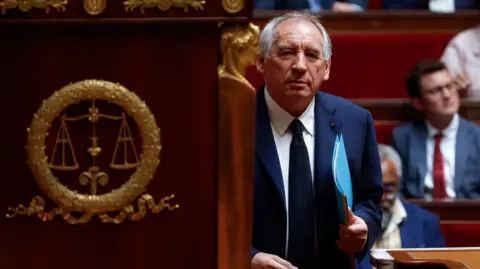 EPA
EPAFrançois Bayrou, the French prime minister, is set to lose a confidence vote on his stewardship, in the latest twist in a period of chaos inside the National Assembly.
Bayrou, 74, is the fourth prime minister in two years under President Emmanuel Macron, whose second term is office has been overshadowed by political instability.
Bayrou's minority government called for €44bn (£38bn) of budget cuts to tackle France's mounting public debt and is now is heading for collapse.
The BBC looks at what led to this political crisis and what could happen next.
French President Emmanuel Macron took a gamble in June 2024.
Faced with a bruising loss for his party in the European Parliament vote, he called a snap parliamentary election which he hoped would achieve "a clear majority in serenity and harmony".
Instead, it resulted in a hung, divided parliament that has made it difficult for any prime minister to garner the necessary support to pass bills and the yearly budget.
Macron appointed Michel Barnier last September but within three months the man who negotiated Brexit for the EU was out - the shortest period since France's post-war Fifth Republic began.
Bayrou is set to suffer the same fate, just under nine months since he came to office last December.
Meanwhile some parties – chiefly on the far right and the far left – continue to clamour for an early presidential election.
Macron has always said he will not stand down before his term ends in 2027.
Instead, he will likely have to choose between appointing a fifth prime minister in less than two years - who again risks working on borrowed time - or calling snap elections for parliament, which could result in an even more hostile National Assembly.
There are few good options for the president as the effects of his June 2024 gamble continue to reverberate.
Bayrou's key issue is France's debt crisis, and what he says is the need to slash government spending to head off a catastrophe for future generations.
Simply put, France's government has for decades spent more money than it has generated. As a result, it has to borrow to cover its budget.
The French government says, in early 2025, public debt stood at €3,345 billion, or 114% of GDP.
That is the third highest public debt in the eurozone after Greece and Italy, and equivalent to almost €50,000 per French citizen.
Last year's budget deficit was 5.8% of GDP and this year's is not expected to be 5.4%. So public debt will continue to grow as borrowing covers the shortfall.
France - like many developed nations - is facing the demographic headache of an ageing population - fewer workers being taxed and more people drawing the state pension.
Bayrou is among those French politicians who want to slash the deficit by redefining generous social programmes - such as state pensions.
In his speech to parliament on Monday, Bayrou spoke of a country on "life support" and addicted to spending.
Two years ago France raised the pension age from 62 to 64 for those born in 1968 or afterwards, and Bayrou has warned that the sense that French workers can stop working during their early 60s is now out of date.
However there is much opposition to further cuts. The government of Bayrou's predecessor collapsed in a confidence vote on the issue last December.
Politicians on the left have called for tax rises, rather than budget cuts.
If as expected Bayrou loses the vote in the National Assembly early this evening, then France is probably heading for another period of doubt, drift and speculation.
It is possible President Emmanuel Macron will act quickly to appoint a new prime minister – it's certainly in the country's interest that he do so.
But practicalities – and precedent – both suggest this could turn out to be a drawn-out process.
Macron has to find a name sufficiently unobjectionable to at least some of the parliamentary opposition that they won't automatically bring him or her down.
The first two PMs in this benighted parliament – Barnier and Bayrou – took weeks to find. The third won't be any easier.
In the meantime Bayrou would presumably stay on as caretaker head of government.
There is pressure from some quarters – notably Marine Le Pen's National Rally – for a new dissolution of the Assembly and parliamentary elections. But there are also strong voices saying it would be a waste of time, because a new vote would be unlikely to change much.
Beyond that there are also voices – from the far left this time – calling for Macron's resignation as president. But don't watch this space. Knowing the character of the man, it is most unlikely to happen.
If Bayrou falls, pressure will be strong on Macron to name a successor from the left. The last two were from the right and centre, and a left alliance came out numerically top in the 2024 election.
Olivier Faure, the leader of the Socialist Party, would be one possibility. The 57-year-old has a group of 66 deputies in the National Assembly.
Two other possibilities from the left are former PM Bernard Cazeneuve, and the veteran ex-minister Pierre Moscovici, currently head of the Cour des Comptes, the official accounting office.
If Macron decides to stick with the centre and right, his first choice would probably be Sebastien Lecornu, 39, the current defence minister who is a member of Macron's Renaissance party and said to be close to the president.
Another conservative whose name has been mentioned is the current minister of labour and health, Catherine Vautrin.
Two other possibilities from inside government are Interior Minister Bruno Retailleau, who now leads the Republicans, and Justice Minister Gérald Darmanin.
But with all eyes on the 2027 presidential election, would these heavyweights want the electoral kiss-of-death which is to be Macron's next PM?

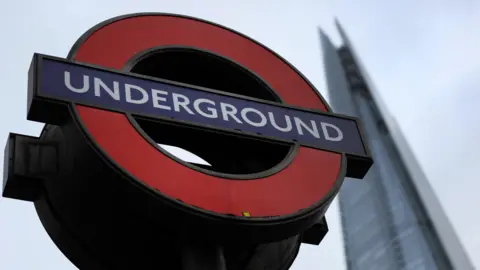 EPA
EPALondon Underground services are continuing to face disruption on Monday, after workers walked out on Sunday in rolling action over pay and conditions.
Members of the Rail, Maritime And Transport union (RMT) are staging the walkout until Thursday.
There is little or no service on all of the Tube as different parts of RMT membership walk out on different days.
The Elizabeth line and the Overground are operating but will be much busier than usual.
You can find out more on which lines are affected on TfL's website.

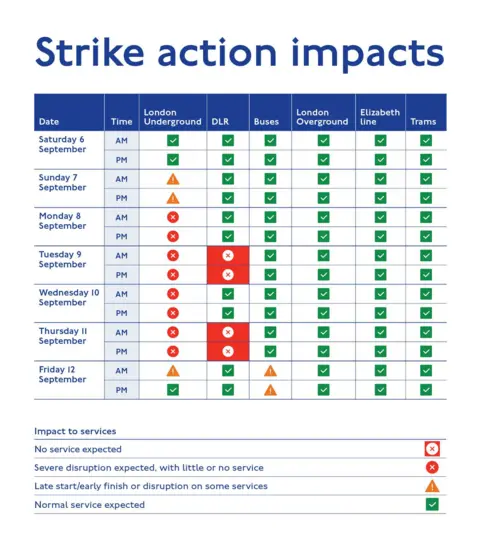 TfL
TfLListen to the best of BBC Radio London on Sounds and follow BBC London on Facebook, X and Instagram. Send your story ideas to hello.bbclondon@bbc.co.uk

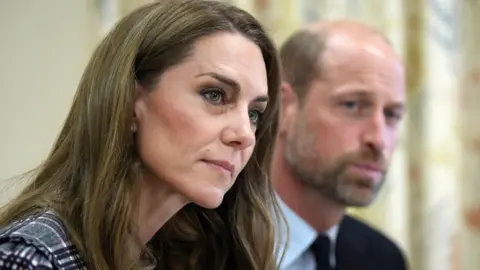 PA Media
PA MediaPrince William and Catherine have paid tribute to the late Queen Elizabeth II on the anniversary of her death, as Prince Harry laid a wreath on his return to the UK.
The Prince and Princess of Wales visited a Women's Institute event in Sunningdale, Berkshire, to meet members of an organisation with a long association with the late Queen.
Elsewhere, Prince Harry - who has arrived back in the UK for the first time in five months - privately laid a wreath and paid his respects to the late Queen in Windsor, where she is buried.
The prince has flown from California and will appear at the WellChild charity awards later on Monday, the first in several planned engagements this week.
Queen Elizabeth, Britain's longest reigning monarch, who died at the age of 96, had been president of the Women's Institute branch in Sunningdale.
Prince William was wearing a dark jacket and tie, at a time of royal mourning for the Duchess of Kent, who died last Thursday.
This is also the anniversary of the accession to the throne of King Charles, who is spending the day in Balmoral in Scotland, where the late Queen died.
There has been speculation about whether Prince Harry will meet his father during his UK visit, with the two not having met face to face since February 2024, soon after King Charles had been diagnosed with cancer.
Prince Harry's wife Meghan and their children have remained at their home in California.


Sign up here to get the latest royal stories and analysis every week with our Royal Watch newsletter. Those outside the UK can sign up here.

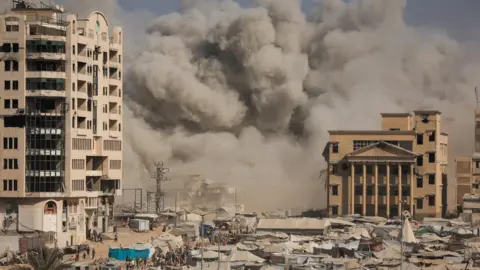 Reuters
ReutersHamas says it has received "some ideas" from the US through mediators on how to reach a Gaza ceasefire agreement.
The Palestinian armed group said it was discussing how to develop the ideas, noting that it was ready to release its 48 remaining hostages in Gaza in return for a "clear" declaration ending the war.
A Palestinian official told the BBC the US plan would see the hostages freed in the first 48 hours of a 60-day truce in exchange for Palestinian prisoners in Israeli jails and good-faith negotiations on a permanent ceasefire.
It came after US President Donald Trump gave Hamas what he called a "last warning" to agree a deal. He said Israel had accepted his terms, without giving details.
Israel's Foreign Minister, Gideon Saar, said it was ready to agree a deal ending the war that would include the release of all the hostages - only 20 of whom are believed to be alive - and the disarmament of Hamas.
Prime Minister Benjamin Netanyahu meanwhile warned the approximately one million Palestinians living in famine-stricken Gaza City to evacuate immediately, as the Israeli military stepped up an offensive to conquer it.
"In the last two days we brought down 50 terrorist high-rises, and this is only the beginning of the ground operation in Gaza City," he said in a video. "I say to the residents of Gaza City: you have been warned, get out of there."
Hospitals said Israeli attacks killed at least 40 people across Gaza on Monday, including 25 in Gaza City and elsewhere in the north.
The Israeli military said four soldiers were killed in combat in northern Gaza.

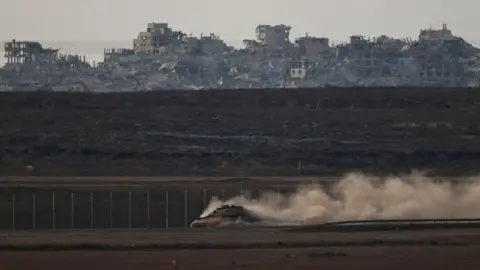 Reuters
ReutersOn Sunday evening, Hamas put out a statement saying it had "received through the mediators some ideas from the American side aimed at reaching a ceasefire agreement" and that it welcomed the initiative.
"The movement is in constant contact with the intermediaries to develop these ideas into a comprehensive agreement that meets the needs of our people," it added.
Hamas said it was ready to immediately negotiate the release of all those who were taken hostage during the group's attack on Israel on 7 October 2023 in exchange for "a clear declaration to end the war, a full withdrawal from Gaza, and the formation of a committee of Palestinian independents to manage Gaza".
Earlier in the day, US President Donald Trump had written on Truth Social: "Everyone wants the Hostages HOME. Everyone wants this War to end! The Israelis have accepted my Terms. It is time for Hamas to accept as well."
"I have warned Hamas about the consequences of not accepting. This is my last warning, there will not be another one!"
A senior Palestinian official familiar with the ceasefire efforts told the BBC that under the US proposal, all of the hostages would be released within the first 48 hours of a 60-day truce in exchange for Palestinian prisoners in Israeli jails, including those serving life sentences and other lengthy terms, and detainees from Gaza.
According to the official, the proposal also includes a personal guarantee from the US president that both sides would hold good-faith negotiations on an end to the war.
During the first two weeks of the truce, the negotiations would cover key issues, including Hamas's disarmament, the formation of an independent governing body or administrative committee in Gaza, and arrangements for Israeli troop withdrawals, the official said. Humanitarian aid would also flow openly into Gaza.
The framework appeared to be aimed at creating a pathway to a broader settlement while addressing immediate humanitarian and security concerns.
Israeli media quoted political sources as saying that Israel was "seriously considering" the US plan, but also that Hamas was likely to have difficulty accepting it.
On Monday, Israeli Foreign Minister Gideon Saar told a news conference in Budapest: "President Trump said it clearly yesterday, Israel said yes to his proposal. We are ready to accept a full deal that would end the war based on the cabinet's decision.
"Two things must happen. One, the return of our hostages… [Two], Hamas must lay down its arms."
Defence Minister Israel Katz at the same time warned Hamas: "Release the hostages and put down your weapons - or Gaza will be destroyed and you will be annihilated."
The Israeli military has been intensifying its air and ground attacks on Gaza City, and on Monday a fourth high-rise building was destroyed in an air strike in as many days.
Video footage verified by the BBC showed the al-Roya 2 building collapsing after being hit by two projectiles.
Before the strike, the Israeli military ordered dozens of displaced families who had been sheltering inside the building to evacuate along those who had been living in tents pitched in the surrounding area.
The military said Hamas fighters responsible for installing "intelligence gathering means and explosive devices" had been operating near the building and "used it throughout the war to plan and advance terror attacks against [Israeli] forces".
"We don't know what to do and where to go. The bombing is insane," Janine Zoarob, a displaced woman who was living in one of the tents, told Reuters news agency. "I am afraid for my children, I am afraid for myself, and I am afraid for those around me."
On Saturday, Israel directed displaced people to head to a newly designated "humanitarian area" in southern Gaza for their "safety". The zone is less than 43 sq km (17 sq miles), which is equivalent to around 12% of the territory.
The military has said there is essential humanitarian infrastructure there. However, the UN has said the tent camps there are already overcrowded and unsafe, and that hospitals are operating several times above capacity.
UN humanitarian chief Tom Fletcher has also warned the window is closing fast to prevent the famine in Gaza City - which was confirmed last month by global food security experts - from spreading to the central city of Deir al-Balah and southern city of Khan Younis by the end of this month.
He called for humanitarian aid to be allowed in unimpeded and at scale, as well as the protection of civilians, a ceasefire and the release of the hostages.
The Israeli military launched a campaign in Gaza in response to the Hamas-led attack on 7 October 2023, in which about 1,200 people were killed and 251 others were taken hostage.
At least 64,522 people have been killed in Israeli attacks in Gaza since then, according to the territory's Hamas-run health ministry.
The ministry also says 393 people, have so far died during the war as a result of malnutrition and starvation, including six over the past 24 hours.

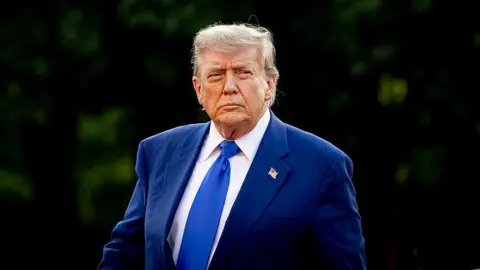 Getty Images
Getty ImagesUS President Donald Trump's administration has asked the Supreme Court to let it withhold more than $4bn (£3bn) in foreign aid.
The administration is seeking an emergency order as it tries to claw back funds for foreign assistance programmes that have already been allocated by Congress.
A lower court last week said the Trump administration had a statutory obligation to spend the money, and an appeals court declined last Friday to freeze that ruling.
The president attempted to use a rarely used legislative tool to withdraw the funds. Since returning to the White House, Trump has cancelled billions of dollars in foreign aid that he says does not align with his objectives.
Solicitor General D John Sauer said in Monday's filing that the lower court's injunction "raises a grave and urgent threat to the separation of powers".
"The President can hardly speak with one voice in foreign affairs or in dealings with Congress when the district court is forcing the Executive Branch to advocate against its own objectives," Sauer wrote.
The Supreme Court could rule at any time.
Last week, Judge Amir Ali ruled the US government had to spend the allocated money unless Congress voted to approve the Trump administration's request.
On 28 August, Trump notified the House of Representatives that the administration would not spend billions in foreign aid allocated by Congress earlier this year.
Those funds include some $3bn for the US Agency for International Development (USAID), as well as money for the state department, international peacekeeping and for democracy-promotion in other countries.
Trump, a Republican, has largely dismantled USAID, the main foreign aid agency, because he said its spending was wasteful.
To revoke the foreign aid money, he said he was using a so-called pocket recission through the Impoundment Control Act, which gives a US president the power to request the cancellation of funds approved by Congress.
Such notice so late in the fiscal year means the money may go unspent because Congress does not have enough time to act on the request.
A group of nonprofits and businesses that receive money for foreign assistance projects filed a legal challenge to the move.
It is reported to be the first time in nearly half a century that the president has moved to unilaterally claw back funding in this way.
The Trump administration has already said it plans to spend another $6.5bn in funds appropriated for foreign aid, following lawsuits from aid groups.
This is not the first time the tussle over foreign aid funding has ended up at the Supreme Court.
In March, the justices rejected a bid from the president to keep $2bn in foreign aid frozen while the case moved forward. It was a 5-4 ruling.

 Getty Images
Getty ImagesThe US Supreme Court has ruled sweeping immigration raids in Los Angeles can continue for now, lifting a federal judge's order that had barred agents from making stops without "reasonable suspicion".
The Monday ruling is a win for President Donald Trump, who has vowed to conduct record-level deportations of migrants in the country illegally.
The 6-3 decision of the conservative-majority court allows agents to stops suspects based solely on their race, language or job, while a legal challenge to the recent immigration sweeps in LA works its way through the courts.
The liberal justices dissented, saying the decision puts constitutional freedoms at risk.
Conservative Justice Brett Kavanaugh wrote in Monday's decision that the lower court's restraining order went too far in restricting how Immigration and Customs Enforcement (ICE) agents could carry out stops or questioning of suspected unlawful migrants.
"To be clear, apparent ethnicity alone cannot furnish reasonable suspicion," he wrote. "However, it can be a 'relevant factor' when considered along with other salient factors."
The Supreme Court's three liberal justices issued a strong dissent penned by Justice Sonia Sotomayor, who wrote that "countless people in the Los Angeles area have been grabbed, thrown to the ground, and handcuffed simply because of their looks, their accents, and the fact they make a living by doing manual labour."
"Today, the Court needlessly subjects countless more to these exact same indignities," she wrote.
The Supreme Court's decision has been criticised by Los Angeles mayor Karen Bass, a Democrat.
"Today's ruling is not only dangerous - it's un-American and threatens the fabric of personal freedom in the United States of America," she said in a statement.
The decision lifts an order by US District Judge Maame E Frimpong in Los Angeles, who had said that there is a "mountain of evidence" showing the raids were violating the US Constitution.
The order halted the raids, with Judge Frimpon saying the Trump administration cannot rely on factors like "apparent race or ethnicity" or "speaking Spanish" alone to stop or question individuals.
The judge also barred immigration enforcement agents from conducting stops based solely on someone's presence "at a particular location" like a bus stop, agricultural site or car wash, or based solely on the type of work an individual does.
The temporary restraining order was issued in a legal challenge by immigration advocacy groups, who argued that immigration officers in Los Angeles were conducting "roving patrols" indiscriminately, and were denying individuals access to lawyers.
Judge Frimpong said this may violate the Fourth Amendment of the Constitution, which prohibits unreasonable searches and seizures by the government.
The Supreme Court, however, said that the administration's actions have a good chance of ultimately being considered constitutional by the federal courts. While its decision only pertained to Judge Frimpong's temporary restraining order, the justices also showed how the court would approach the lawsuit should it have to consider an appeal down the road.
Lawyers for the Department of Homeland Security have argued that immigration officers are targeting people based on their legal status in the US, not skin colour, race or ethnicity.
They have also said that Judge Frimpong's order wrongly restricted ICE operations.
The Trump administration began sweeping immigration raids in Los Angeles in June, stopping and arresting people at Home Depot and other workplaces, and were met with immediate protests and civil unrest..
Trump then deployed nearly 2,000 National Guard troops and 700 Marines in response, without authorisation from the state of California.
A federal judge has since ruled that the National Guard deployment was illegal. The White House responded that "a rogue judge is trying to usurp" the president's authority "to protect American cities from violence and destruction."
The US Supreme Court's decision to let the raids continue comes as the Trump administration looks to ramp up law enforcement in other cities, including Washington DC.
In August, Trump ordered National Guard troops to the American capital to address what he says is high crime in the city, and is also using federal officers to bolster the district's law enforcement.
He is now signalling that this week he will decide if he will also send federal law enforcement and the National Guard to Chicago.

路透社9月8日消息,鉴于西方资本市场仍然对俄罗斯关闭,多家俄罗斯大型企业,包括俄国家原子能公司和俄气工业股份等,开始研究发行以人民币计价的“熊猫债券”。
自2022年俄乌战争全面爆发以来,俄罗斯公司已被切断与西方资本市场的联系。路透社引述英国金融时报当天的报道称,随着中国国家主席习近平与俄罗斯总统普京加深“无上限”的双边伙伴关系,中国正准备重新向俄罗斯主要能源企业开放其国内债券市场。路透社回顾称,自战争爆发以来,还没有俄罗斯公司发行过熊猫债。此前仅有一家俄企——铝生产商俄铝发行过熊猫债。
普京上周访问中国时,呼吁为全球南方国家建立联合金融基础设施,并建议上合成员国联合发行债券。
几天前,中国评级机构中证鹏元给拥有世界最大天然气储量的俄气公司其最高等级的AAA评级。这被认为是给该公司可能在中国国内债券市场发债铺平道路之举。不过也列出,该公司面临“高度的地缘政治风险”。这正值中俄两国批准“西伯利亚力量2号”这一庞大天然气管道项目之际。该项目将进一步连接两国,并减少对西方的经济依赖。俄国家原子能公司发言人也表示,该公司正准备在中国发行以人民币计价的债券。
俄罗斯副财长伊万·切贝斯科夫9月8日对俄新社表示,“原则上,我们看到了俄罗斯债券发行方的兴趣”。不过,俄财政部在当天的一份声明中表示,其更倾向于在俄发行以人民币计价的主权债券,而不是在中国发行熊猫债。财政部补充称,其目标是通过存管桥的方式,使中国大陆的投资者能够直接与俄罗斯建立联系,从而增加俄罗斯市场上人民币的流动性。
不过,路透社也指出,任何俄罗斯债券的发行仍需要得到中国监管机构的批准,而潜在购买者也必须权衡美国和欧洲的二级制裁所带来的风险。俄罗斯最大评级机构Expert RA分析师利先科对路透社表示,债券发行仍需获得中国监管部门批准,而监管方会考虑地缘政治风险。因此,这一过程可能需要数年。

© Serhii Korovainyi/Reuters

© Mark Abramson for The New York Times

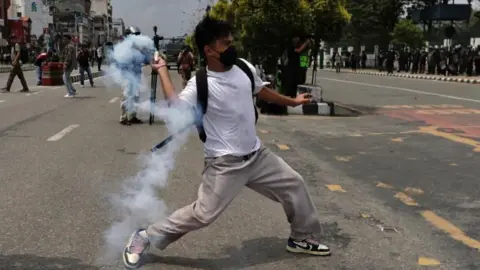 Reuters
ReutersAt least 13 people have been killed and dozens are injured in Nepal after demonstrations against a government social media ban led to clashes between protesters and security forces.
Thousands heeded a call by demonstrators describing themselves as Generation Z to gather near the parliament building in Kathmandu over the decision to ban platforms including Facebook, X and YouTube.
Nepal's Minister for Communication Prithvi Subba told the BBC police had had to use force - which included water cannons, batons and firing rubber bullets.
The government has said social media platforms need to be regulated to tackle fake news, hate speech and online fraud.
But popular platforms such as Instagram have millions of users in Nepal, who rely on them for entertainment, news and business.
Demonstrators carried placards with slogans including "enough is enough" and "end to corruption".
Some said they were protesting against what they called the authoritarian attitude of the government.
As the rally moved into a restricted area close to parliament, some protesters climbed over the wall.
"Tear gas and water cannons were used after the protesters breached into the restricted area," police spokesman Shekhar Khanal told the AFP news agency.
A Kathmandu district office spokesperson said a curfew was imposed around areas including the parliament building after protesters attempted to enter.
Last week authorities ordered the blocking of 26 social media platforms for not complying with a deadline to register with Nepal's ministry of communication and information technology.
Since Friday, users have experienced difficulty in accessing the platforms, though some are using VPNs to get around the ban. So far, two platforms have been reactivated after registering with the ministry following the ban.
Nepal's government has argued it is not banning social media but trying to bring them in line with Nepali law.

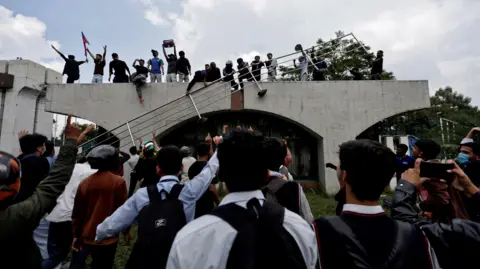 Reuters
ReutersThis breaking news story is being updated and more details will be published shortly. Please refresh the page for the fullest version.
You can receive Breaking News on a smartphone or tablet via the BBC News App. You can also follow @BBCBreaking on X to get the latest alerts.

 Getty Images
Getty ImagesUS President Donald Trump's administration has asked the Supreme Court to let it withhold more than $4bn (£3bn) in foreign aid.
The administration is seeking an emergency order as it tries to claw back funds for foreign assistance programmes that have already been allocated by Congress.
A lower court last week said the Trump administration had a statutory obligation to spend the money, and an appeals court declined last Friday to freeze that ruling.
The president attempted to use a rarely used legislative tool to withdraw the funds. Since returning to the White House, Trump has cancelled billions of dollars in foreign aid that he says does not align with his objectives.
Solicitor General D John Sauer said in Monday's filing that the lower court's injunction "raises a grave and urgent threat to the separation of powers".
"The President can hardly speak with one voice in foreign affairs or in dealings with Congress when the district court is forcing the Executive Branch to advocate against its own objectives," Sauer wrote.
The Supreme Court could rule at any time.
Last week, Judge Amir Ali ruled the US government had to spend the allocated money unless Congress voted to approve the Trump administration's request.
On 28 August, Trump notified the House of Representatives that the administration would not spend billions in foreign aid allocated by Congress earlier this year.
Those funds include some $3bn for the US Agency for International Development (USAID), as well as money for the state department, international peacekeeping and for democracy-promotion in other countries.
Trump, a Republican, has largely dismantled USAID, the main foreign aid agency, because he said its spending was wasteful.
To revoke the foreign aid money, he said he was using a so-called pocket recission through the Impoundment Control Act, which gives a US president the power to request the cancellation of funds approved by Congress.
Such notice so late in the fiscal year means the money may go unspent because Congress does not have enough time to act on the request.
A group of nonprofits and businesses that receive money for foreign assistance projects filed a legal challenge to the move.
It is reported to be the first time in nearly half a century that the president has moved to unilaterally claw back funding in this way.
The Trump administration has already said it plans to spend another $6.5bn in funds appropriated for foreign aid, following lawsuits from aid groups.
This is not the first time the tussle over foreign aid funding has ended up at the Supreme Court.
In March, the justices rejected a bid from the president to keep $2bn in foreign aid frozen while the case moved forward. It was a 5-4 ruling.

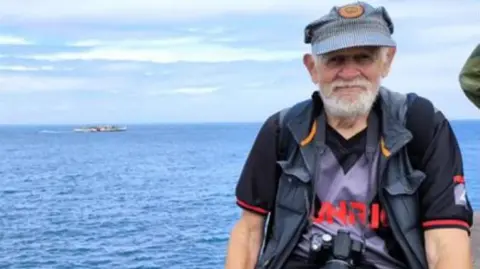 Family photo
Family photoThe third British victim killed in the Lisbon funicular crash has been named by police.
David Young, 82, from Holyhead on Anglesey, was among 16 people who died last Wednesday when the Glória funicular derailed and crashed into a building in Portugal's capital.
His family described him as a "lifelong transport enthusiast", saying it was a comfort that "his final moments were in pursuit of the hobby which gave him so much happiness".
Over the weekend Cheshire Police confirmed the other British victims were Kayleigh Smith, 36, and her partner Will Nelson, 44.
Known to most as Dave, he was raised in Auchterarder, Perthshire, but moved to Holyhead in 1980 where he had a "long career as a customs officer".
"In retirement he enjoyed visiting heritage railways and tramways around the world," they said," his family said.
Llinos Medi, MP for Ynys Môn, sent her condolences to Mr Young's family and "to those who have been affected".
Prime Minister Sir Keir Starmer said he was "deeply saddened" by the incident.
"His thoughts are with their families and those affected by this terrible incident," a spokesperson said.
"We stand united with Portugal during this difficult time."

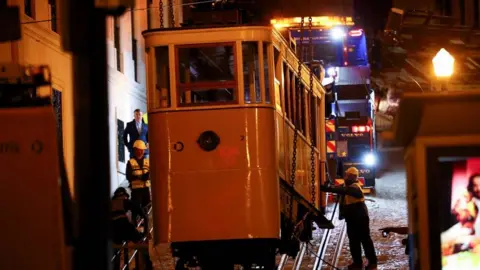 Reuters
ReutersThe city's funicular railways - Glória, Lavra, Bica and Graça - are a popular tourist attraction and known for their yellow tram-like vehicles.
Officials said a cable along the railway's route snapped, but the rest of the mechanism was functioning properly.
The brakeman tried to apply emergency brakes but failed to prevent the derailment,
The cause of the crash remains unknown.
Nationals of Portugal, South Korea, Switzerland, Canada, France, Britain, Ukraine and the US are among the dead, according to police.

 EPA
EPAFrançois Bayrou, the French prime minister, is set to lose a confidence vote on his stewardship, in the latest twist in a period of chaos inside the National Assembly.
Bayrou, 74, is the fourth prime minister in two years under President Emmanuel Macron, whose second term is office has been overshadowed by political instability.
Bayrou's minority government called for €44bn (£38bn) of budget cuts to tackle France's mounting public debt and is now is heading for collapse.
The BBC looks at what led to this political crisis and what could happen next.
French President Emmanuel Macron took a gamble in June 2024.
Faced with a bruising loss for his party in the European Parliament vote, he called a snap parliamentary election which he hoped would achieve "a clear majority in serenity and harmony".
Instead, it resulted in a hung, divided parliament that has made it difficult for any prime minister to garner the necessary support to pass bills and the yearly budget.
Macron appointed Michel Barnier last September but within three months the man who negotiated Brexit for the EU was out - the shortest period since France's post-war Fifth Republic began.
Bayrou is set to suffer the same fate, just under nine months since he came to office last December.
Meanwhile some parties – chiefly on the far right and the far left – continue to clamour for an early presidential election.
Macron has always said he will not stand down before his term ends in 2027.
Instead, he will likely have to choose between appointing a fifth prime minister in less than two years - who again risks working on borrowed time - or calling snap elections for parliament, which could result in an even more hostile National Assembly.
There are few good options for the president as the effects of his June 2024 gamble continue to reverberate.
Bayrou's key issue is France's debt crisis, and what he says is the need to slash government spending to head off a catastrophe for future generations.
Simply put, France's government has for decades spent more money than it has generated. As a result, it has to borrow to cover its budget.
The French government says, in early 2025, public debt stood at €3,345 billion, or 114% of GDP.
That is the third highest public debt in the eurozone after Greece and Italy, and equivalent to almost €50,000 per French citizen.
Last year's budget deficit was 5.8% of GDP and this year's is not expected to be 5.4%. So public debt will continue to grow as borrowing covers the shortfall.
France - like many developed nations - is facing the demographic headache of an ageing population - fewer workers being taxed and more people drawing the state pension.
Bayrou is among those French politicians who want to slash the deficit by redefining generous social programmes - such as state pensions.
In his speech to parliament on Monday, Bayrou spoke of a country on "life support" and addicted to spending.
Two years ago France raised the pension age from 62 to 64 for those born in 1968 or afterwards, and Bayrou has warned that the sense that French workers can stop working during their early 60s is now out of date.
However there is much opposition to further cuts. The government of Bayrou's predecessor collapsed in a confidence vote on the issue last December.
Politicians on the left have called for tax rises, rather than budget cuts.
If as expected Bayrou loses the vote in the National Assembly early this evening, then France is probably heading for another period of doubt, drift and speculation.
It is possible President Emmanuel Macron will act quickly to appoint a new prime minister – it's certainly in the country's interest that he do so.
But practicalities – and precedent – both suggest this could turn out to be a drawn-out process.
Macron has to find a name sufficiently unobjectionable to at least some of the parliamentary opposition that they won't automatically bring him or her down.
The first two PMs in this benighted parliament – Barnier and Bayrou – took weeks to find. The third won't be any easier.
In the meantime Bayrou would presumably stay on as caretaker head of government.
There is pressure from some quarters – notably Marine Le Pen's National Rally – for a new dissolution of the Assembly and parliamentary elections. But there are also strong voices saying it would be a waste of time, because a new vote would be unlikely to change much.
Beyond that there are also voices – from the far left this time – calling for Macron's resignation as president. But don't watch this space. Knowing the character of the man, it is most unlikely to happen.
If Bayrou falls, pressure will be strong on Macron to name a successor from the left. The last two were from the right and centre, and a left alliance came out numerically top in the 2024 election.
Olivier Faure, the leader of the Socialist Party, would be one possibility. The 57-year-old has a group of 66 deputies in the National Assembly.
Two other possibilities from the left are former PM Bernard Cazeneuve, and the veteran ex-minister Pierre Moscovici, currently head of the Cour des Comptes, the official accounting office.
If Macron decides to stick with the centre and right, his first choice would probably be Sebastien Lecornu, 39, the current defence minister who is a member of Macron's Renaissance party and said to be close to the president.
Another conservative whose name has been mentioned is the current minister of labour and health, Catherine Vautrin.
Two other possibilities from inside government are Interior Minister Bruno Retailleau, who now leads the Republicans, and Justice Minister Gérald Darmanin.
But with all eyes on the 2027 presidential election, would these heavyweights want the electoral kiss-of-death which is to be Macron's next PM?
On 11 September 2021, Tom Phillips and his three children went missing for the first time.
His Toyota Hilux was found parked below a tide line at a beach near his parents' home in Marokopa on New Zealand's North Island. Police launched a massive search operation by land, sea and air.
Less than three weeks later, the family returned home, with the father claiming they had been on a camping trip.
Then, on 12 December that year, they vanished again. Aside from a few chance sightings and grainy frames of CCTV footage, the bushman and his three children had not been seen since.
That was, until the early hours of Monday morning, when police responding to a report of an attempted burglary entered into a shoot-out that resulted in Mr Phillips' death, ending a four-year manhunt.
Many questions about his disappearance remain, including why he took his children and disappeared into New Zealand's harsh wilderness, and whether he was able to evade capture for so long by having help.
When Mr Phillips returned home for the first time in 2021, he was charged with wasting police resources. The search effort over the harsh, unforgiving landscape of the western Waitomo region had cost New Zealand authorities hundreds of thousands of dollars.
Police did not launch a fresh search the second time he and his three children - Ember, Maverick, and Jayda, aged five, seven and eight, respectively, at the time - went missing.
When he failed to appear at a court appearance on 12 January 2022, police issued a warrant for his arrest.
Mr Phillips returned to his family home alone at night to collect supplies on 9 February that year.
He was then not seen for more than a year.

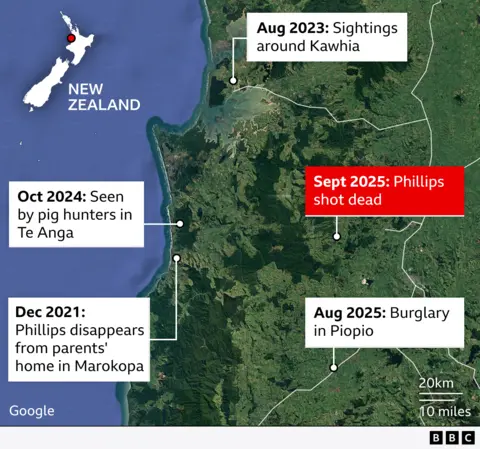
Police have said in the past they believed Mr Phillips took his children - now aged nine, 10 and 12 - over a custody dispute with their mother, though he never offered any explanation as to why he had done this.
Mr Phillips was known to be a bushman who had some survival training. Locals in Marokopa have said he was someone who wanted to be off the grid and had not been on any social media platforms.
Police believed he and his children had survived out in the dense wilderness surrounding Marokopa.
But it seems Mr Phillips and his children could not survive in the bush on their wits alone.
There was a string of sightings around Kawhia between August and November 2023, including multiple alleged robberies, as well as at a hardware store and on quad bikes.
CCTV footage captured around that time appeared to show Mr Phillips and one of his children - both wearing camouflage and masks over their faces - attempting to break into a store in Piopio, south-west of Marokopa, police said.
When Mr Phillips was shot on Monday, police said they found multiple firearms and other loot on his quad bike.
Police have previously said they believed Mr Phillips was being aided in his evasion by others.
When he was suspected of a bank robbery in Te Kuiti, a small town in the Waitomo region, police said there was an accomplice.
Fewer than 100 people live in the tight-knit community of Marokopa. While there was no suggestion that his family had assisted him, given the custody dispute, there have been questions about whether someone who knew him was helping him remain hidden or knew of his whereabouts.
In June 2024, police issued an NZ$80,000 (£37,200) reward for information that might lead to the location of Mr Phillips and his three children. The deadline expired without any breakthroughs.
They were next seen that October. A group of teenage pig hunters who had been trekking through the bush around Marokopa spotted them and filmed the brief encounter on their phones.
In the grainy footage, Mr Phillips could be seen leading his children through the rugged terrain, all wearing camouflaged clothing, raincoats and large backpacks.
New Zealand media reported that the teenagers had briefly spoken to one of their children to ask if anyone knew they were there. The child had replied "only you" and kept walking, the father of one of the teenagers told New Zealand's 1News.
The sighting prompted an unsuccessful three-day search involving police and army helicopters. Police said last month that they felt an aggressive search was the wrong approach, as they said Mr Phillips was armed and considered dangerous.

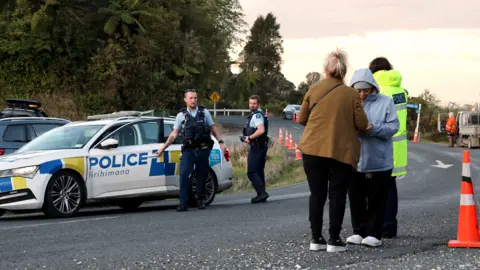 Getty Images
Getty ImagesHe was not seen again until late August this year, when he and one of his children were captured on CCTV allegedly breaking into a store in Piopio, making off with grocery items.
It was Piopio he returned to on Monday morning. It was at about 02:30 local time (14:30 GMT on Sunday) that police were called to a report of an attempted burglary at a rural farm supply shop there, which police believe Mr Phillips had unsuccessfully targeted before.
A quad bike carrying two people was seen heading towards Marokopa. Police laid spikes along the road and, when these stopped the quad bike, officers said they were met with gunfire.
Police said the first officer to reach the scene was shot in the head and he remains in a serious condition. A second officer returned fire and Mr Phillips died at the scene, police said.
The child who was with him was unharmed and provided police with information that led them to the other two children, who were at a remote campsite in the bush between Marokopa and Te Kuiti in near-freezing conditions, police said.
The children - whose wellbeing had been the top concern in New Zealand throughout their disappearance - are now being cared for by the authorities.

© Philip Cheung for The New York Times

© Philip Cheung for The New York Times

© Michael Ciaglo for The New York Times

© Jennifer Taylor for The New York Times

© Chris Jackson/Chris Jackson Collection, via Getty Images

法国国民议会议员于周一罢免了弗朗索瓦·贝鲁,拒绝了其就公共财政状况提出的信任投票请求。据一位亲信透露,弗朗索瓦·贝鲁是法兰西第五共和国首位在信任投票中被罢免的政府首脑,他将于周二上午向总统埃马纽埃尔·马克龙提交辞呈。
在一场激烈的辩论结束后,仅有194名议员投票支持他请求的信任票。
这一数字远远不足以抵挡364名反对票,这些反对者涵盖从国民阵线到法国不屈服党等多个派别。
虽然结果早已预料,但依然具有历史意义:弗朗索瓦·贝鲁并非必须请求信任投票,却成为第五共和国史上首位在信任投票中失败的政府首脑。
他说:“我主动接受了这场考事实真相的考验……最危险的是选择不去面对。” 但他选择面对了。
目光现在转向马克龙,如果他想避免再次解散议会,必须尽快找到一位新总理。
多名人选被提及:国防部长塞巴斯蒂安·勒科尔努、司法部长热拉尔·达尔马宁、劳动与健康部长凯瑟琳·沃特兰、经济部长埃里克·隆巴尔,法兰西北部大区共和党主席泽维尔·贝特朗,前外交部长、前社会党人让-伊夫·勒德里昂……
这些人选遭到国民阵线和法国不屈服党的强烈反对。
国民阵线领导人勒庞在议会表示:“鉴于当前政治形势,新政府很可能无法通过预算讨论。”她强调,“解散议会对马克龙来说不是选择,而是义务。”
法国不屈服党则继续要求马克龙辞职或被弹劾,其议员将提交相关动议。该党团负责人马蒂尔德·帕诺特周一宣称:“总统不愿改变政策?那我们就必须更换总统。”
On 11 September 2021, Tom Phillips and his three children went missing for the first time.
His Toyota Hilux was found parked below a tide line at a beach near his parents' home in Marokopa on New Zealand's North Island. Police launched a massive search operation by land, sea and air.
Less than three weeks later, the family returned home, with the father claiming they had been on a camping trip.
Then, on 12 December that year, they vanished again. Aside from a few chance sightings and grainy frames of CCTV footage, the bushman and his three children had not been seen since.
That was, until the early hours of Monday morning, when police responding to a report of an attempted burglary entered into a shoot-out that resulted in Mr Phillips' death, ending a four-year manhunt.
Many questions about his disappearance remain, including why he took his children and disappeared into New Zealand's harsh wilderness, and whether he was able to evade capture for so long by having help.
When Mr Phillips returned home for the first time in 2021, he was charged with wasting police resources. The search effort over the harsh, unforgiving landscape of the western Waitomo region had cost New Zealand authorities hundreds of thousands of dollars.
Police did not launch a fresh search the second time he and his three children - Ember, Maverick, and Jayda, aged five, seven and eight, respectively, at the time - went missing.
When he failed to appear at a court appearance on 12 January 2022, police issued a warrant for his arrest.
Mr Phillips returned to his family home alone at night to collect supplies on 9 February that year.
He was then not seen for more than a year.


Police have said in the past they believed Mr Phillips took his children - now aged nine, 10 and 12 - over a custody dispute with their mother, though he never offered any explanation as to why he had done this.
Mr Phillips was known to be a bushman who had some survival training. Locals in Marokopa have said he was someone who wanted to be off the grid and had not been on any social media platforms.
Police believed he and his children had survived out in the dense wilderness surrounding Marokopa.
But it seems Mr Phillips and his children could not survive in the bush on their wits alone.
There was a string of sightings around Kawhia between August and November 2023, including multiple alleged robberies, as well as at a hardware store and on quad bikes.
CCTV footage captured around that time appeared to show Mr Phillips and one of his children - both wearing camouflage and masks over their faces - attempting to break into a store in Piopio, south-west of Marokopa, police said.
When Mr Phillips was shot on Monday, police said they found multiple firearms and other loot on his quad bike.
Police have previously said they believed Mr Phillips was being aided in his evasion by others.
When he was suspected of a bank robbery in Te Kuiti, a small town in the Waitomo region, police said there was an accomplice.
Fewer than 100 people live in the tight-knit community of Marokopa. While there was no suggestion that his family had assisted him, given the custody dispute, there have been questions about whether someone who knew him was helping him remain hidden or knew of his whereabouts.
In June 2024, police issued an NZ$80,000 (£37,200) reward for information that might lead to the location of Mr Phillips and his three children. The deadline expired without any breakthroughs.
They were next seen that October. A group of teenage pig hunters who had been trekking through the bush around Marokopa spotted them and filmed the brief encounter on their phones.
In the grainy footage, Mr Phillips could be seen leading his children through the rugged terrain, all wearing camouflaged clothing, raincoats and large backpacks.
New Zealand media reported that the teenagers had briefly spoken to one of their children to ask if anyone knew they were there. The child had replied "only you" and kept walking, the father of one of the teenagers told New Zealand's 1News.
The sighting prompted an unsuccessful three-day search involving police and army helicopters. Police said last month that they felt an aggressive search was the wrong approach, as they said Mr Phillips was armed and considered dangerous.

 Getty Images
Getty ImagesHe was not seen again until late August this year, when he and one of his children were captured on CCTV allegedly breaking into a store in Piopio, making off with grocery items.
It was Piopio he returned to on Monday morning. It was at about 02:30 local time (14:30 GMT on Sunday) that police were called to a report of an attempted burglary at a rural farm supply shop there, which police believe Mr Phillips had unsuccessfully targeted before.
A quad bike carrying two people was seen heading towards Marokopa. Police laid spikes along the road and, when these stopped the quad bike, officers said they were met with gunfire.
Police said the first officer to reach the scene was shot in the head and he remains in a serious condition. A second officer returned fire and Mr Phillips died at the scene, police said.
The child who was with him was unharmed and provided police with information that led them to the other two children, who were at a remote campsite in the bush between Marokopa and Te Kuiti in near-freezing conditions, police said.
The children - whose wellbeing had been the top concern in New Zealand throughout their disappearance - are now being cared for by the authorities.

 BBC
BBCFood critic Grace Dent and chef Anna Haugh are the new hosts of MasterChef, after Gregg Wallace and John Torode were sacked.
Dent has appeared regularly as a guest on MasterChef, while Haugh has been a judge on the spin-off Professionals series.
Wallace and Torode had hosted the show for 20 years, but were axed in July after a report upheld claims against them.
The BBC decided to broadcast this year's amateurs series of MasterChef - with both Wallace and Torode in it - for the sake of the chefs who had taken part in it.

 BBC/Shine TV
BBC/Shine TVAuthor and podcaster Dent was a contestant on MasterChef: Battle Of The Critics in 2023.
Last year, it was announced that she would host the next series of Celebrity MasterChef alongside Torode, after Wallace temporarily stepped back from presenting the show following allegations against him.
The BBC has not yet announced what it plans to do with the completed celebrity series.
Dublin-born chef Anna Haugh is the founder of Myrtle restaurant in London, and is also a familiar face on TV screens.
She replaced Wallace in the final episodes of the current MasterChef amateurs series, as that's when the allegations against him first emerged during filming in November.
The BBC has also confirmed that chef and television presenter Matt Tebbutt will replace Wallace as a judge on the next series of MasterChef: The Professionals.
The Saturday Kitchen host will join Marcus Wareing and Monica Galetti on the programme.
The controversy over MasterChef started last year, when BBC News first revealed claims of inappropriate sexual comments against Wallace.
The show's production company ordered an immediate inquiry into the allegations. This summer, the report upheld more than 40 claims against Wallace including one of unwelcome physical contact and three of being in a state of undress.
A claim that Torode had used a severely offensive racist term was also substantiated.
Wallace has insisted he was cleared of the "most serious" allegations, while Torode says he has "no recollection" of the incident.



Carlos Alcaraz might only be 22, but he is already producing results that put him alongside some of the biggest stars tennis has ever known
When Carlos Alcaraz won his sixth Grand Slam title on Sunday, he did so by thoroughly outclassing the world's number one player in probably the best performance of his career so far.
Defending US Open champion Jannik Sinner - whose record on hard courts over the past two seasons is among the most imperious of any player on any surface in tennis history - was induced into a timid display in which he was overawed by the Spaniard.
The quality of Alcaraz's performance in his 6-2 3-6 6-1 6-4 victory led to something of an existential crisis in Sinner, who insisted afterwards that he needs to revamp game in order match Alcaraz's level.
For his part, Alcaraz believes he is reaching new heights.
"I played perfectly," he said after lifting the trophy. "This is the best tournament so far that I have ever played. The consistency of my level has been really, really high - it's something I've been working on."
At age 22, Alcaraz is already talked about among the sport's greatest ever players. But just how well does he rank against them so far?
BBC Sport has examined how he compares against the men's game's legends at the same stage of their careers.
Since Alcaraz joined the ATP Tour as a 16-year-old, he has been lauded for the variety of his play, being able to combine cutting low slices with ferocious forehands and deft drop shots to consistently catch opponents off guard and win points in breathtaking ways.
But his ability to stitch together that kind of all-around quality on any surface is what is already setting him apart from anybody else.
Alcaraz has now won two Grand Slams on each of the hard, grass, and clay surfaces – only Rafael Nadal (when aged 24), Mats Wilander (aged 24), and Novak Djokovic (aged 34), have ever achieved the same feat in the men's game.
The speed at which Alcaraz is racking up the majors is astonishing, too - he has taken only 19 tournaments to win six slams, second only to the record of 18 set by Bjorn Borg in 1978.
Only Borg has won six slams at a younger age than Alcaraz, doing so by winning three on clay at Roland Garros and three on grass at Wimbledon.
At 22 Nadal also had six (but won the last of those when he was a few months older than Alcaraz), while Pete Sampras was on five, and Wilander four.
The likes of eight-time Wimbledon winner Roger Federer (three) and 24-time Grand Slam champion Djokovic (one) were way behind the pace of Alcaraz at his age.
Alcaraz won the first of his Grand Slam titles in New York in 2022 aged 19, and followed it up with his maiden Wimbledon triumph the following year.
In the past two seasons he has won two majors per year. If he were to carry on at that trajectory, he would equal Djokovic's tally of 24 in 2034, when he will be 31 and should still have many years of his career ahead of him.
The rate at which Alcaraz is winning matches on the biggest stages also makes clear that he already belongs in the most illustrious company.
During 2025 he has equalled Nadal's record for most Grand Slams in a calendar year by a player aged 22 or younger, and is second only to Borg for match win percentage at Grand Slams at this age.
Alcaraz's serve has never been a weakness, but he rendered it one of his most irrepressible weapons in New York by increasing his power to levels he has never before shown.
Against Sinner he served a stunning 10 aces, raising his average serve speed from 113mph to 120mph between his opening victory against Reilly Opelka and the final.
During the tournament Alcaraz won 84% of his first-serve points and 63% on his second serve, both higher than anybody else in the tournament, and hit the fastest serve of any player during the final, clocking a whopping 134mph.
Compared to Roland Garros and Wimbledon earlier this year, when Alcaraz beat and then lost to Sinner in the finals, the difference in serve speed is stark.
The set Alcaraz lost in the latest final was the only one he dropped in the entire tournament, and the three breaks of serve he suffered during the fortnight are the second-lowest in Grand Slams since 1991 - Sampras was only broken twice when he won Wimbledon in 1997.
And most impressively of all, the measly 10 break points he faced during the fortnight are the lowest of any Grand Slam winner since 1991.
Despite his glowing review of his own performance at Flushing Meadows, Alcaraz still believes he has a way to go before he reaches his pinnacle.
"At 22 years old, it's difficult to already be at your maximum level", he said after demolishing Sinner. "Little by little I'll keep improving to try and get there.
"The best Carlos hasn't come out yet."
Aside from terrifying the rest of the tour, that statement begs a big question - how exactly can Alcaraz possibly improve from here?
It's true that the Spaniard remains prone to occasional bouts of erratic shot-making during high-level matches, sometimes succumbing to half-an-hour or so spells in which his touch and depth appear to desert him.
Indeed, in the set he lost to Sunday on Sinner, Alcaraz made 11 unforced errors, compared to only two each in the previous and following sets.

Alcaraz's win makes him the new world number one, and leads his head-to-head record against Jannik Sinner 10-5
Cutting those periods out could be a way to maintain his peak ruthlessness and restrict the chance for top quality opponents to gain a foothold in matches.
And if the improvement in the serve is anything to go by, perhaps Alcaraz could even add further development to some of the already immensely impressive skills he possesses.
During Sunday's final he hit a couple of groundstrokes that surpassed 100mph, a staggering level of speed to be reaching during rallies against any player, never mind one who hits as hard as Sinner. Striking at that kind of speed on a more regular basis would make him almost impossible to beat.
No matter how he develops his game and how many more majors he wins from here, Alcaraz has already demonstrated that he is among the very best players the sport has known.
Fans around the world can now watch and see whether, by the end of his career, he is lauded as the undisputed greatest ever.
Additional data collection and visualisations by Jordan Butler.


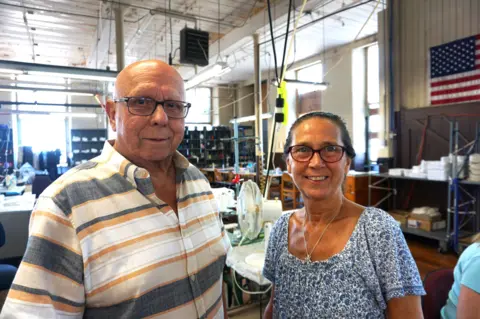 BBC
BBCIn a corner of a cavernous 1890s factory in southern Massachusetts, 15 people are bent over sewing machines, churning out specialty, hospital-grade neonatal gear.
They are all that remain of what was once a much bigger manufacturing operation, most of which the Teixeira family shut down in 1990, reinventing their business as a largely warehousing and distribution business.
Since US President Donald Trump started rolling out sweeping tariffs, the Teixeiras have been fielding more inquiries from companies newly interested in their US-based sewing services.
But they have turned down those offers, deterred by the difficulty of hiring in the midst of an immigration crackdown and doubts that the demand will be sustained.
It's just one of the many indications that achieving the manufacturing revival promised by the president is likely to be far more difficult than the White House has claimed.
"It's just not going to happen," said Frank Teixeira, who joined the family business in the 1970s and oversaw its dismantling and reinvention as Accurate Services Inc.
"Tariffs are a bad policy and eventually are going to come home to haunt us."
Trump campaigned for the presidency on the promise of a better economy, engineered in part by tariffs that he said would lower costs and usher in a new golden age.
The message proved to resonate with voters, helping the campaign make unexpected inroads in working-class areas long considered Democratic strongholds.
That includes the Teixeiras' base of Fall River, a former textile manufacturing hub, where Trump's win marked the first in the city by a Republican presidential candidate in roughly a century.
But his plans were widely panned by experts, who warned that the tariffs, which are a tax on imports, would instead raise prices for American businesses and consumers and slow growth - with particular risks for manufacturers, who often rely on imported supplies.
Now nine months into the president's term as the tariffs take hold, the gulf between Trump's rhetoric, which boasts of investments pouring into the country, and the reality on the ground in places like Fall River, is starting to show.


Employment growth in the US has slowed precipitously this year, including in manufacturing. After expanding after the pandemic, payrolls at manufacturing firms have shrunk this year, shedding 12,000 jobs last month alone.
Business surveys indicate that activity in the sector is in contraction.
Last month, 71% of manufacturers questioned by the Dallas branch of the Federal Reserve said the tariffs - which range from 10% to 50% on most imports - had already had a negative impact on their business, raising the cost of resources and hurting profits.
At Matouk, a maker of high-end bedding up the road from the Teixeiras', boss George Matouk said that between April and August tariffs had already added more than $100,000 (£74,000) a month in costs, as they hit supplies like cotton fabric from India and Portugal and down from Liechtenstein.

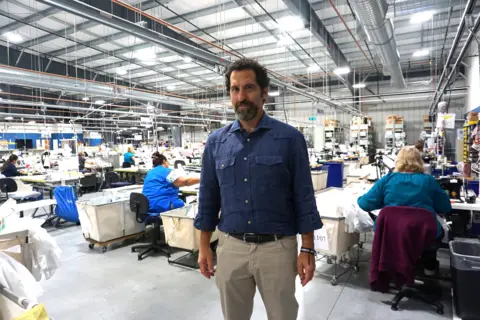
Founded by his grandfather in 1929, the company has grown to employ about 300 people in recent years - a point of pride for Mr Matouk, who faced naysayers when he returned as the third generation to join the family business after graduating from Columbia Business School in the late 1990s.
But the sudden tariff expense has forced the firm to cut investments on things such as new equipment and spending on discretionary items like marketing.
Despite the made-in-America distinction of many of his products, Mr Matouk said he expected no benefits from the tariffs because higher costs were pushing him to raise prices, a move likely to weigh on sales.
"Because the materials are subject to tariffs just like everything else, the benefits are not there," he said.
Mr Matouk called the current challenges faced by his firm "demoralising in a new way", since they have been inflicted deliberately, by government policy.
"We've done all of the things we were supposed to do in order to invest in the industrial base of the United States when no one else was willing to do it and it's just really frustrating that now we're being penalised," he said.


Studies on the impact of the more limited tariffs imposed by Trump during his first term on manufacturers in the US have found that small job gains in protected industries, like steel, were more than offset by losses at other firms that were dependent on parts.
But Mike van der Sleesen, who runs motorcycle jacket business Vanson Leathers, said he thought the changes this year had been so disruptive that it was premature to make predictions.
Mr van der Sleesen, who voted for Trump last year, is no fan of the president's tariffs, which have driven up his costs some 15% this year.
However, he shared the president's concerns that foreign companies could easily access the US market, while US firms looking to sell abroad encounter hurdles in the form of tariffs and other taxes.

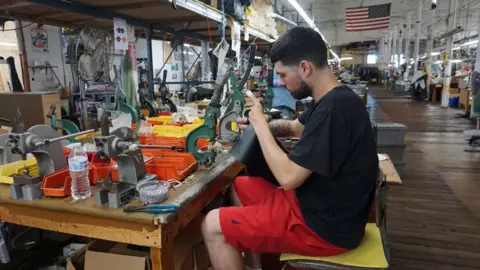
"It's been a very uneven and unfair trade path for a company like Vanson," said Mr van der Sleesen, whose business was founded in 1974 and employed more than 160 people as recently as 2000, before the wallop of China's entry into the global order shrunk the workforce to about 50.
"We shouldn't charge them and they shouldn't charge us in my view but that's never going to happen," he said.
For now, demand for his jackets, which can sell for thousands of dollars, has held up. He said his suppliers in the US were reporting an uptick in activity.
"We haven't heard overtime in the textile world for 20 years!" he said. "It's hard to be confident that you can predict what it's going to shake out to be because the changes have been so dramatic."

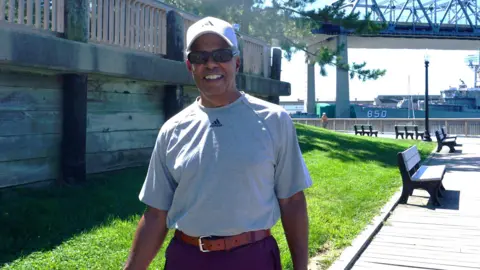
On the streets of Fall River, many Trump supporters said they remained willing to give the president time to put his strategy to the test.
"We should be able to manufacture," said Tom Teixeira.
The 72-year-old retired transit worker voted for Trump in 2016, 2020 and 2024, won over in part by his message on the economy.
"I know how it was and it can improve but it's not going to improve overnight," said Mr Teixeira, who is not related to the Teixeira manufacturers, adding that he had yet to notice any major price increases this year.
"A year from now, if things aren't cheaper, we'll see."